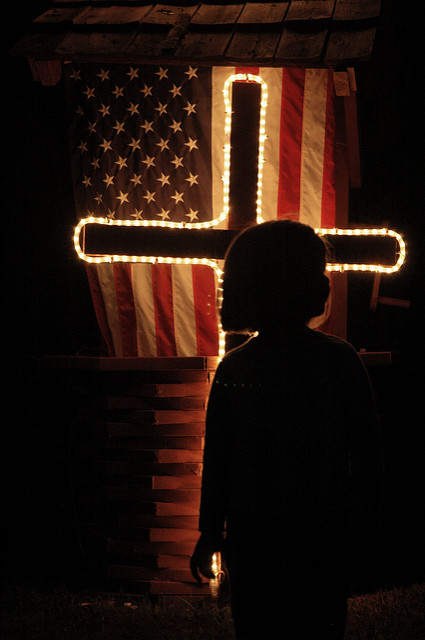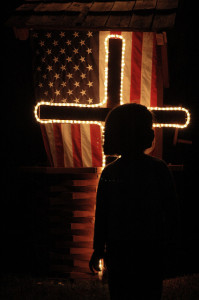Arise, Anti-Trump Christians
 Can faith make American democracy stronger?
https://flic.kr/p/5wfpSB
Can faith make American democracy stronger?
https://flic.kr/p/5wfpSB
In February, Donald Trump posted on his Facebook page “Let me be clear—I am pro-life”. This looked to many like an effort to reach out to Christian voters, especially after displaying his ignorance about faith issues (2 Corinthians, anybody?). Partly through later outreach efforts, including the pick of Mike Pence as VP, Donald Trump won Catholics (including Democratic-leaning Hispanic Catholics) by 4% and Protestants by 23%.
Despite his wins among these faith groups, President Trump’s actions since taking office are, frankly, an affront to the values the Bible calls Christians to stand for. Just a few days ago, he signed an executive order to ban refugees from a number of Middle Eastern nations. Lest we forget, the most famous Middle Eastern refugees were none other than Mary, Joseph, and Jesus, who escaped a tyrant. Moreover, throughout the Bible, numerous verses call upon Christians to be welcoming and loving towards the oppressed, including immigrants. Moreover, Trump also signed an executive order beginning the dismantling of Obamacare, which would leave 18 million Americans without healthcare. Christians ought to look towards Jesus’ actions in healing the marginalized and ill when evaluating the Trump administration. Don’t even get me started on how Trump’s bullying and hateful language run contrary to the spirit of love espoused by Christian faiths.

https://flic.kr/p/HDAYN
These theological rifts with Trump lead naturally into deep value-based rifts. Catholic Social Teaching espouses seven key themes which connect to value placed on the “life and dignity of the human person.” Social teaching focuses not just on ending abortion, but on helping the poor, caring for the environment, and advocating for the rights of the oppressed. A Pew survey of Evangelical Christians found that 73% believe helping the poor is an essential part of their faith, while 85% believe protecting the environment is important or essential. These beliefs transcend politics and provide ripe ground for outreach and organization. Christians who hold these values must stand up against Trump.
I understand that while many Christians have similar core values, policy differences will (and should) exist. Healthy debate over the best ways to carry out ethical goals, such as whether to use charity or government, ought to exist. There is no one party that is the “Christian party,” and often faith values should transcend party lines.
Thus, I’m advocating for additional resistance to the Trump Administration based mostly on Christian values. Christians concerned with Donald Trump, be they Baptist, Catholic, Lutheran, or another denomination, should put their faith at the forefront of their vocal opposition. This will likely start with those who lean left, but there is immense potential for a broader movement of liberals, moderates, and even some conservatives. After all, the aforementioned values bind different denominations together. These bonds ought to be stronger than the various theological and sometimes political divides within Christianity. Only by fostering and building connections can a Christian movement against Trump’s agenda rise.
Strategies exist for this organization. Michael Wear, a former Obama administration faith outreach director, notes that the best means for the left to galvanize Evangelical and Catholic support is to find common ground and to allow a certain degree of flexibility on touchy issues. The politician who best exemplified this approach was perhaps the least religious one running: Bernie Sanders. Sanders’ speech at Liberty University, a bastion of American Evangelical Christianity, openly confronted differences between his views and the prevailing views of the university. However, most of the speech focused on the need for dialogue and the search for common threads upon which we can organize, which is critical moving forward.

https://flic.kr/p/5wfpSB
Finally, this new Christian resistance movement should invoke history to gain traction. After all, America harbours a long history of anti-Catholicism similar to the vitriol directed at Muslims by the Trump Administration. In fact, immigration restrictions such as those passed in 1924 were in part influenced by anti-Catholicism. Thus, empathy and solidarity can develop from an awareness of the similar struggles many Christians underwent quite recently.
The seeds are there. Various Catholic groups have already come out against Trump’s actions for the border wall and against sanctuary cities. Christian groups from many denominations strongly oppose his executive orders banning refugees and entry from certain nations. However, Christians and their affiliated organizations have a duty to help organize laypeople into an opposition movement. A morality-based, broad anti-Trump Christian coalition truly can make a difference and would greatly strengthen the resistance movement. Arise, Christians. Band together and develop a plan to promote our common values and fight bigotry, oppression, and division.
